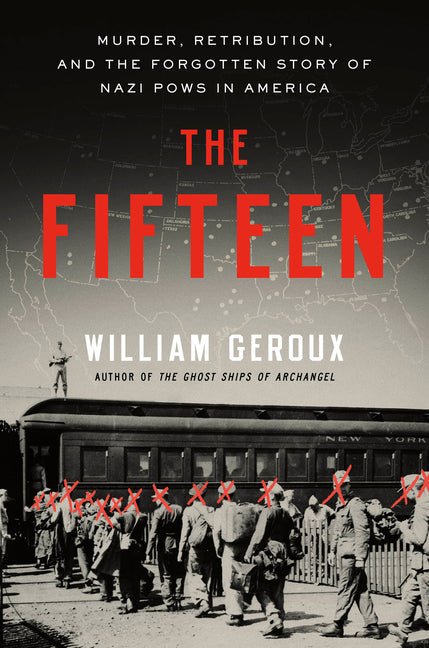Crown Publishing Group (NY)
The Fifteen: Murder, Retribution, and the Forgotten Story of Nazi POWs in America
Couldn't load pickup availability
The revelatory true story of the long-forgotten POW camps for German soldiers erected in hundreds of small U.S. towns during World War II, and the secret Nazi killings that ensnared fifteen brave American POWs in a high-stakes showdown.
“In the pantheon of American history, it’s very hard to find compelling, original stories, and even harder to find authors worthy of them. In The Fifteen, William Geroux delivers the goods.”—John U. Bacon, New York Times bestselling author of The Great Halifax Explosion
The American government was faced with an unprecedented challenge: where to house the nearly 400,000 German prisoners of war plucked from the battlefield and shipped across the Atlantic. On orders from President Franklin D. Roosevelt, the Department of War hastily built hundreds of POW camps in the United States. Today, traces of those camps—which once dotted the landscape from Maine to California—have all but vanished. Forgotten, too, is the grisly series of killings that took place within them: Nazi power games playing out in the heart of the United States.
Protected by the Geneva Convention, German POWs were well-fed and housed. Many worked on American farms, and a few would even go on to marry farmers’ daughters. Ardent Nazis in the camps, however, took a dim view of fellow Germans who befriended their captors.
Soon, the killings began. In camp after camp, Nazis attacked fellow Germans they deemed disloyal. Fifteen were sentenced to death by secret U.S. military tribunals for acts of murder. In response, German authorities condemned fifteen American POWs to the same fate, and, in the waning days of the war, Germany proposed an audacious trade: fifteen German lives for fifteen American lives.
Drawing on extensive research, journalist and author William Geroux shines a spotlight on this story of murder and high-stakes diplomacy, and on the fifteen American lives that hung in the balance—from a fearless P-51 Mustang fighter pilot to a hot-tempered lieutenant colonel nicknamed “King Kong.”
Propulsive and vividly rendered, The Fifteen reminds us that what happens to soldiers after they exit the battlefield can be just as harrowing as what they experience on it.
Share
Book Details
ISBN:
9780593594254
EAN:
0593594258
Binding:
Hardcover
Pages:
400
Authors:
William Geroux
Publisher:
Crown Publishing Group (NY)

I initially purchased this book specifically for the brief references of a specific US Naval ship and my grandfather’s experience with German and Italian prisoners of war in Oran and in the States. The book turned out to be an excellent read and I give a strong recommendation to anyone interested in the personal stories of prisoners of war, both Allies and Axis, during and after WWII.
Although I'm a student of World War II history, my familiarity with this topic was pretty thin. I had an older coworker who lived in Mississippi as a boy during the war in a town that had a POW camp nearby. He recalled that the German POWs often were rounded up on main street where they simply wandered around, curious. This was always interesting to me.The author tells a good story, but I am forced to question his research. For instance, he describes the P-51 aircraft flown by one of the American protagonists as having two .50 caliber machineguns in the nose and two .30 caliber machineguns in each wing. Well, no version of the P-51 had this armament, and no credible reference would describe it as such. So...did the author simply make it up? And why should I believe anything he wrote about the aspects of this subject about which I'm not familiar?Another example is his repeated references to the German POWs and their transistor radios. The transistor radio wasn't invented until 1947, after the war, and its widespread introduction to the public didn't happen until the 1950s. So...where did he get this information?In one instance he calls a main protagonist a lieutenant commander. This is a Navy rank. The man was actually a lieutenant colonel in the Army. Sloppy editing.In the audio version there were obvious edits as the tenor of the voice would abruptly change. A little bit jarring. But the narrator was otherwise very good.So...are these and other minor inaccuracies huge distractors? No, except that I'm compelled to question the material about which I have little familiarity. However, I'm still glad I read the book as I believe that, if not perfectly accurate, it made me better educated about the topic than I was before.Recommended with reservations.
I found this to be incredibly well written. It's obvious much research went into writing this. I would definitely recommend this book and will have to check out the authors other books. I live within a mile of one of the POW camp locations so I was aware from a cursory level that they existed, but I didn't know there were as many POWs here. Well crafted, glad I picked this one up on a whim.
Very good book. I had heard as a teen ager there was a POW camp in Massachusetts. Had no idea there were over 200 across the country. Very good story, very informative
Great story of POW camps for Germans in US. Dispels the notion that all Germans were fanatical Nazis. But some clearly were. Very interesting read.


